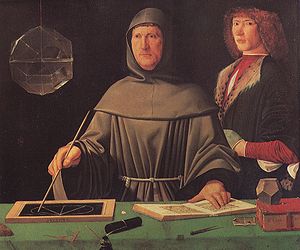During the Italian renaissance merchants transitioned from using Roman numerals (I, V, X, C, etc.) to Arabic numerals (1, 5, 10, 100). One of the innovations of using this number system was the ability to add and subtract more efficiently.
One of Leonardo Da Vinci’s friends, Luca Pacioli, took advantage of this innovation in his accounting.
Instead of just counting his cash at the end of the day, Luca was able to do what’s called double-entry bookkeeping. Whenever a product is sold, Luca would record how much money he made, as well as how much of his product he gave away. For example, if he sold one loaf of bread for one gold coin, he would record +1 gold coin and -1 loaf.
This allowed him to analyze which of his products were more successful and therefore allowed him to redirect his operations appropriately.
The use of such accounting is now essential to modern business. Some companies are unable to realize what isn’t working as apposed to what is. Without knowing what is failing, a business is unable to cut their losses. This relates to strategy discussions we’ve had in class. With double-entry bookkeeping comes the first way of evaluating strategy vs. operational efficiency. The merchant can cut losses and know when a new idea is necessary, whereas before there was only finding cheaper prices and better time management.
Luca Pacioli is an unsung hero of the modern business world.
http://en.wikipedia.org/wiki/Double-entry_bookkeeping_system
http://www.npr.org/blogs/money/2012/10/04/162296423/the-accountant-who-changed-the-world

